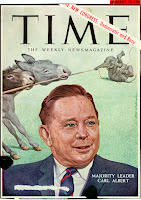Early Years and Education
Born on May 10, 1908, in Oklahoma, Carl Albert's journey towards greatness began in his hometown. He attended McAlester High School, where he honed his impressive speaking skills. In 1927, he won a regional oratorical contest, and the following year, he emerged victorious in a national competition. These early successes laid the foundation for his future in politics.
After graduating from the University of Oklahoma in 1931, Albert received the prestigious Rhodes Scholarship. This opportunity led him to England, where he spent three years studying at Oxford University. His academic achievements and experiences abroad broadened his horizons and prepared him for the challenges ahead.
Service to the Nation
With the outbreak of World War II, Carl Albert answered the call to duty by serving in the United States Army from 1941 to 1946. His dedication and commitment to his country were evident throughout his military service.
A Distinguished Political Career
Following his military service, Carl Albert embarked on a distinguished political career that would span several decades. He represented the United States House of Representatives from 1947 to 1977, becoming the longest-serving representative in Oklahoma's history at the time of his retirement.
Throughout his tenure in Congress, Albert held various significant positions. He served as House Majority Whip from 1955 to 1961, House Majority Leader from 1962 to 1971, Chairman of the Platform Committee in 1964, and Chairman of the National Democratic Convention in 1968. However, his most notable achievement came in 1971 when he was elected Speaker of the House of Representatives, a position he held for six years.
Challenges and Leadership
Carl Albert's time as Speaker of the House was marked by significant challenges. The nation was deeply divided over the Vietnam War, and the Watergate scandal threatened the very foundations of constitutional order. In the face of these crises, Albert conducted the business of the House with dignity, integrity, and a steadfast commitment to the rule of law. He played a critical role as the second in the line of presidential succession, ensuring the continuity of government during tumultuous times. His leadership left the speakership a far more powerful and respected office than when he began his tenure.
A Legacy of Honors
After retiring from politics, Carl Albert returned to his hometown in Oklahoma, where he continued to be recognized for his outstanding contributions to society. He received numerous awards and honors, including the Oklahoma Will Rogers Award in 1979, the University of Oklahoma's Distinguished Alumnus Award in 1990, and an honorary doctorate from the University of Oklahoma in 1991. The League of Women Voters named him Oklahoma Statesman of the Year in 1993, and the Oklahoma Broadcasters Association honored him as Oklahoman of the Year.
A Life Devoted to Service
Carl Albert's dedication to public service extended beyond politics. His early involvement in the DeMolay youth organization foreshadowed a lifelong commitment to the principles of leadership, integrity, and civic engagement. He was initiated into the Daniel M. Hailey Chapter of DeMolay in McAlester, Oklahoma, in 1926, setting the stage for his future as a respected Freemason. He belonged to South McAlester Lodge #46, achieved the rank of Scottish Rite 33rd Degree Mason, and received the DeMolay Legion of Honor.
In recognition of his exemplary contributions, Carl Albert was inducted into the DeMolay Hall of Fame on June 21, 1996, cementing his legacy as a Senior DeMolay who had risen to become one of the most influential figures in American politics.
Conclusion
Carl Albert's remarkable journey from a young man with a gift for oratory to the esteemed position of Speaker of the House of Representatives serves as an inspiration to all. His unwavering dedication to his country, his state, and his principles is a testament to the enduring values of leadership, integrity, and public service. Carl Albert's legacy continues to shine as a beacon of hope for future generations of leaders and citizens.





No comments:
Post a Comment